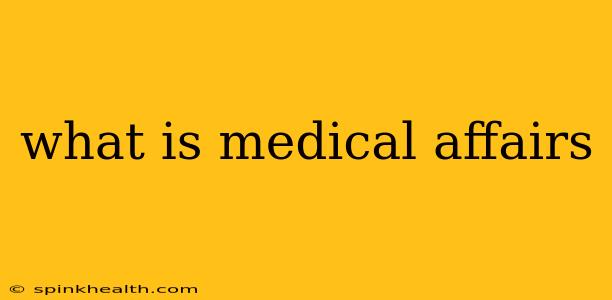What is Medical Affairs? A Journey into the Heart of Healthcare
Imagine a world where groundbreaking medical research never quite reaches the doctors and patients who need it most. That's where Medical Affairs steps in – acting as the vital bridge between scientific innovation and real-world healthcare. It's a dynamic field that blends scientific expertise, strategic thinking, and a deep understanding of the healthcare landscape. Think of it as the translator, the advocate, and the strategist all rolled into one.
Medical Affairs isn't about selling drugs; it's about ensuring the right drugs are used right. It's a multifaceted role that influences how medical professionals understand and utilize healthcare products, ultimately improving patient outcomes.
What Does a Medical Affairs Team Do?
The work of a Medical Affairs team is as diverse as the healthcare system itself. Their core responsibility is to provide unbiased, scientific information about a company's products to healthcare professionals (HCPs). But this involves much more than simply handing out pamphlets. Let's delve into the key activities:
1. Medical and Scientific Communication: This is the bread and butter of Medical Affairs. They create and disseminate scientific data through publications, presentations at medical conferences, and educational materials for HCPs. They're skilled communicators, translating complex scientific findings into easily digestible information.
2. Medical Information: Responding to inquiries from HCPs about medications and therapies is a significant part of the job. This requires a deep understanding of the science behind the products, as well as regulatory guidelines and best practices.
3. Health Outcomes Research: Medical Affairs teams often conduct or collaborate on research projects to assess the real-world effectiveness and safety of products. This helps to provide evidence-based insights for HCPs and policymakers.
4. Publication Planning: Getting research findings published in reputable medical journals is crucial for influencing medical practice. Medical Affairs teams play a key role in planning, coordinating, and supporting this process.
5. Medical Strategy and Planning: Beyond the day-to-day activities, Medical Affairs teams develop long-term strategies to ensure the company's products are understood and used appropriately within the healthcare community. This includes anticipating market trends and adapting strategies accordingly.
6. Regulatory Affairs Liaison: While distinct from regulatory affairs, Medical Affairs teams work closely with the regulatory team to ensure compliance and understand the implications of new regulations on their scientific communication and activities.
What are the Different Roles in Medical Affairs?
Medical Affairs encompasses a variety of roles, each requiring a unique skillset:
- Medical Science Liaison (MSL): These professionals are the face of Medical Affairs, interacting directly with HCPs to provide scientific expertise and answer their questions.
- Medical Information Specialist: Focused on responding to medical inquiries and ensuring accurate and up-to-date information is disseminated.
- Publication Manager: Responsible for the planning, coordination, and execution of publications in peer-reviewed journals.
- Health Outcomes Research Scientist: Leads and participates in research studies to understand the real-world effectiveness of therapies.
- Medical Affairs Director: Leads and manages the overall Medical Affairs team and its strategic direction.
How Does Medical Affairs Differ from Sales and Marketing?
This is a crucial distinction. While all three functions work together to support a company's products, their focus differs significantly:
- Sales: Focuses on promoting and selling products to generate revenue.
- Marketing: Develops strategies to promote the products to target audiences, including HCPs and patients.
- Medical Affairs: Focuses on providing unbiased scientific information to HCPs to support the appropriate use of products and improve patient outcomes. It is strictly non-promotional in nature.
What Skills are Needed for a Career in Medical Affairs?
A successful career in Medical Affairs requires a unique blend of skills:
- Strong scientific background: A degree in a relevant life science field is typically required.
- Excellent communication skills: The ability to communicate complex scientific information clearly and concisely is essential.
- Strategic thinking: Developing and executing long-term strategies requires analytical and strategic thinking skills.
- Collaboration and teamwork: Medical Affairs teams work closely with other departments, requiring excellent collaborative skills.
- Knowledge of regulatory guidelines: Understanding and adhering to regulatory guidelines is crucial.
In conclusion, Medical Affairs is more than just a job; it's a mission. It's about ensuring that scientific advancements translate into better health for patients worldwide. It's a field driven by passion for science, a dedication to ethical conduct, and a commitment to improving patient care.

